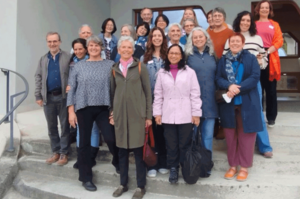Support through movement
At the invitation of the Pedagogical Section, twenty-three learning support teachers from all over the world met in Dornach with pedagogical section co-leader, Philipp Reubke, from October 25-27, 2024. The aim of the event was to build a picture of the needs of today's school children and to consider how an international learning support teachers conference could be organized for 2025.
The program included presentations by experienced colleagues, the diversity of which demonstrated a broad spectrum of possible approaches. It soon became apparent for us to clearly experience the common intersections in all the presentations: The child, who has become unbalanced for various reasons, often lacking basic skills, can be helped individually with a wide variety of integrative sensory-motor ways of working. All contributions and the joint exchange were characterized by an intensive study and dedication to anthroposophical ways of working.
The lecture content
Joep Eikenboom provided lectures for the group. He made a clear distinction between the constitutional physical development of a child who tends to be cared for by a special education approach alongside the structural physical development that often is not yet fully developed in a school child who benefits from learning support from a pedagogical perspective. Such a student presents obstacles or difficulties in some areas, but these do not affect a pathology for the whole person. Children who benefit from learning support do not have a «diagnosis», but are expressing outwardly their inward experience in areas where regular development has gaps or arrests. The result is observable responses to the external influences in the classroom environment, which presents challenges for class management by their teachers.
Phillip Reubke underlined the importance of Early Childhood Education. There must be movements and actions worth imitating. Relationships from person-to-person are always crucial – including the educator/teacher to the child and to the parents. These relationships should not be demanding or lecturing but convey an interest in the encounter. Healthy relationships with children and parents are fundamental to successful educational work.
Presentations from the field
Many of the following reports from the field complemented each other in their approach or view of the causes of or support for children with learning difficulties. Their presentations are briefly summarized below:
Ingun Schneider presented the foundational, bodily senses – Touch, Life, Self-Movement and Static Balance. Each of the senses and their development contribute to a successful learning experience for the child. When these body senses are underdeveloped, the student experiences learning blocks and difficulties, which in turn can be overcome by work that recapitulates the development of these senses to fill in the gaps or arrests that exist. A classroom approach for brief daily practice was emphasized.
Two participants looked at children's learning opportunities from the perspective of immature and insufficiently integrated early childhood movement patterns (often referred to as «primitive reflexes»):
Sibylle Raupach presented the development from pregnancy to the first year of life from the perspective of immaturities that prevent learning. Laura Pellico offered practical examples of how the residual reactions of early childhood movement patterns can be transformed and matured through daily motor exercises in the classroom.

Brigitte von Schwarzenfeld reported on her work with dyslexia that spans a week of intensive working with the student in her private practice.
It became very practical for classroom applications when Gordon Woolard showed how he presents fractions with pupils in a sensory way that made the concept of fractions immediately apparent. In another session, he described the possibility of using auditory training to improve auditory processing in children.
Ana Ramos shared short videos of her class working with the exercises from The Extra Lesson. According to the school doctor, consistent adherence to this work has shown clear results for improvements in learning in the students in her class compared to other classes.
To the general delight and interruption of the more sitting and listening sessions, Kris Boshell gave us an insight every morning into her classroom support work by demonstrating how to build up foundational skills with beanbag work with a large group in a classroom setting. The brief daily exercise practice included engagement of the imagination along with building skills first with clapping and then using beanbags with stepping and speaking which we all tried out with concentration.
Planning for the conference
Time and space was given by this group to work out the focal points for the next conference that included conversation in small discussion groups. The overriding idea, based on the experience of all participants, was that ALL children today benefit greatly from receiving concrete and consistently repeated motor stimulation in various ways in the lower school. Therefore, it was agreed upon that the conference should not only be offered to learning support teachers but also should include an invitation for classroom teachers for students of all ages, including the early childhood and kindergarten teachers. In this day and age, it made sense to all present that it would be beneficial in our modern times for ALL students to participate in brief, daily movement exercises in support of bringing ease to their learning and joy to every student’s educational experience.
It was customary at this time of year that the school doctors were also meeting for a conference at the Goetheanum. Karin Michael, co-leader of the Medical Section, was therefore able to join our group for a discussion session where we were able to begin an exchange of possibilities for collaboration in the future.
The date for the conference at the Goetheanum has been set with more details to come. Save the date: 23 to 26 October 2025.
Sibylle Raupach, Hanover
Tanslation: Kris Boshell